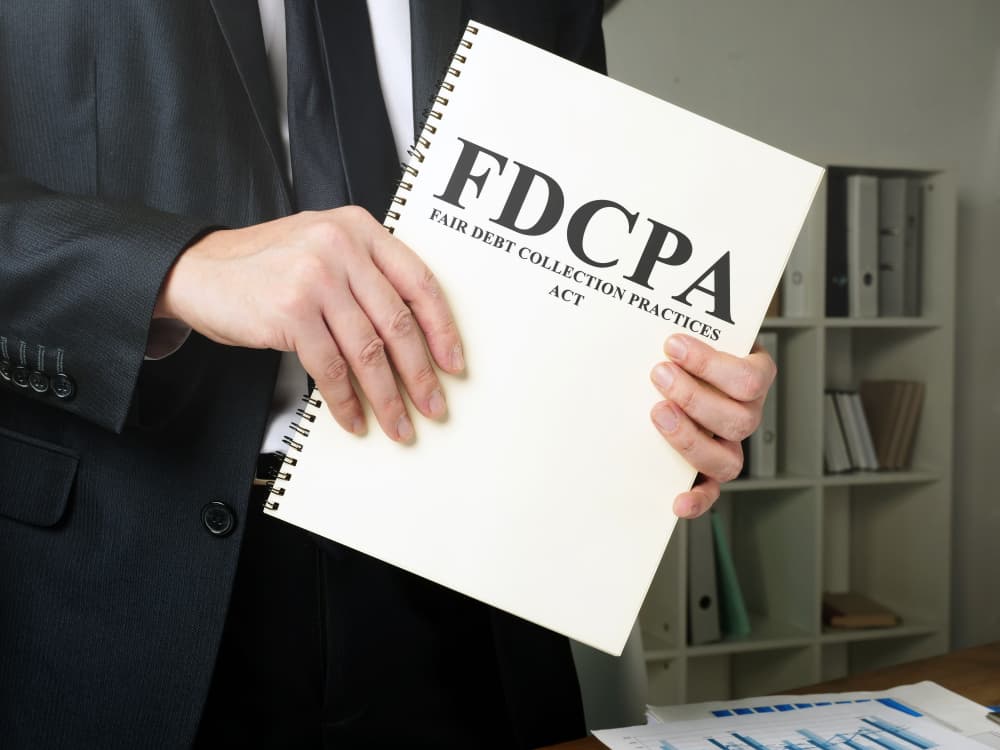The Fair Debt Collection Practices Act (FDCPA) is a shield against unfair debt collection practices, but it has its limitations.
In addition to exploring FDCPA law, this guide will explain the different layers of consumer rights that can quietly slip through the FDCPA's protective net.
Whenever people are uncertain about the nature of their debt and what debt is not covered by the FDCPA when dealing with debt collectors, it is advisable to consult with an experienced FDCPA lawyer for guidance and help.
What Is the FDCPA?

The Fair Debt Collection Practices Act, enacted in 1977, serves as a shield for consumers against abusive and deceptive practices by debt collectors.
It outlines the methods debt collectors can use when contacting debtors and specifies the rights of consumers in these interactions.
The FDCPA primarily covers personal, family, and household debts, including credit card debt, medical bills, and other similar types of personal loans.
Despite its comprehensive nature, the FDCPA does not encompass all types of debts. Understanding the distinction between covered and non-covered debts under the FDCPA is important for consumers so they can accurately assess their rights when having to deal with debt collectors.
What Debts Are Not Covered Under the FDCPA?
While the FDCPA offers protection against certain types of debt collection practices, it's important to note that not all debts are shielded under this act.
Business Debts
As of 2023, there are approximately 33.3 million small businesses in the United States. This number represents nearly all (99.9 percent) of U.S. businesses, showing the significant proportion of the American workforce dealing with business-related debts that are not covered by the FDCPA.
The U.S. Small Business Administration's Office of Advocacy provides further insight, stating that small businesses employ 61.7 million Americans, making up 46.4 percent of the private sector workforce. This statistic highlights the substantial impact of business debts on a large segment of the population.
Why doesn’t the FDCPA protect businesses? The FDCPA is designed to protect individual consumers. Therefore, debts incurred for business or commercial purposes are not covered. This means if you have debts related to your business, the FDCPA does not apply to the collection of these debts.
Certain 'Non-Consumer' Debts
Besides business debts, other categories of non-consumer debts fall outside the FDCPA's purview. For instance, debts that were not incurred for personal, family, or household purposes are not covered. This is a notable distinction for people who may have various types of debt obligations.
Debts Owed to the Government
Another important aspect to consider under the FDCPA is the treatment of debts owed to the government.
The following are examples of government debts not covered under the FDCPA.
- Taxes: Debts due to unpaid federal, state, or local taxes are not covered by the FDCPA. The collection of tax debts is governed by different statutes and regulations, which means the protections and restrictions of the FDCPA do not apply.
- Fines and Other Government-Related Debts: Similar to tax debts, fines imposed by governmental entities, such as traffic tickets or court-imposed fines, are also not covered by the FDCPA. Additionally, debts like government-backed student loans have unique collection rules that fall outside the FDCPA's purview.
Understanding these exclusions helps in comprehending the full scope of the FDCPA and in recognizing when its protections apply and when they do not.
What Are Some Debts Protected by the FDCPA?
Mortgages

A common area of confusion regarding the FDCPA's applicability involves mortgages and auto loans.
It's important to clarify that while these are personal debts, the FDCPA's protection can vary based on certain conditions.
Generally, mortgage debts are covered under the FDCPA. However, if the debt is not in default, the actions of the mortgage servicer may not fall under the scope of the FDCPA. This distinction is significant for homeowners in understanding their rights under the Act.
Automobile Loans
Similar to mortgage debts, auto loans are typically personal debts and are covered by the FDCPA. However, the coverage is contingent upon the loan being in default. If the auto loan is current, the FDCPA's provisions might not apply to the lender’s collection actions.
Revolving Credit
Revolving credit is a type of credit that does not have a fixed number of payments, in contrast to installment credit. It is a flexible financing tool that allows consumers to borrow up to a certain limit and pay back a portion or all of the balance each month.
Common examples of revolving credit include credit cards and home equity lines of credit. The Federal Reserve's report on consumer credit as of 2023 indicates that the amount of revolving credit increased over the past year in the US.
Medical Debts
Medical debts are covered by the Fair Debt Collection Practices Act (FDCPA). When medical debts transfer to a third-party debt collector, the FDCPA regulated the collection activities for these debts.
This means that debt collectors attempting to recover medical debts must adhere to the same rules and restrictions that apply to other types of consumer debts under the FDCPA, such as not using deceptive or abusive practices.
There have been recent legislative changes in Colorado and New York regarding the reporting of medical debt. Colorado amended its Consumer Credit Reporting Act, effective August 7, 2023, to restrict misleading representations about medical debt in consumer reports unless linked to high-value credit transactions.
New York's Fair Medical Debt Reporting Act, effective December 13, 2023, prohibits hospitals and other health entities from reporting medical debts to consumer reporting agencies.
These state laws aim to protect residents from the negative credit impacts of medical debt. However, the article suggests this might lead to more medical debt delinquencies, potential court actions, and possible healthcare price increases for paying consumers.
Student Loan Debt
Student loans, including both federal and private loans, are covered by the Fair Debt Collection Practices Act (FDCPA) when they are being collected by third-party debt collectors.
This means the FDCPA regulates how debt collectors can contact borrowers and what practices they can use in collecting these debts.
However, the FDCPA does not apply to the original creditor, so if the loan is being collected by the entity that originally issued it (such as the federal government for federal student loans), the FDCPA's protections do not apply.
Understanding the types of debts that are protected by the FDCPA can help individuals better manage their expectations when dealing with debt collectors and their practices depending on the type of debt they have.
When in doubt, seeking legal advice from a FDCPA lawyer can provide clarity in stressful situations that are tailored to your specific situation.
Frequently Asked Questions on the Fair Debt Collection Practices Act (FDCPA)
What types of debts are covered under the FDCPA?
The FDCPA covers household debts, including credit card debt, car loans, medical bills, student loans, and mortgages. Business debts are not protected under the FDCPA.
Are there restrictions on how debt collectors can contact me?
Debt collectors are not allowed to contact you before 8 a.m. or after 9 p.m. They cannot contact you at work if you inform them that you're not allowed to receive calls there. They must also refrain from contacting you by email, text message, or social media if you request them to stop.
What must a debt collector tell me about the debt?
Debt collectors are required to provide validation information about the debt either during their first communication with you or within five days afterward. This information includes the collector's name and address, the creditor's name, the amount owed, and your rights regarding disputing the debt.
Can a debt collector contact my friends or family about my debt?
Debt collectors can contact others to find out your address, home phone number, and workplace. However, they generally cannot discuss your debt with anyone other than you, your spouse, or your attorney if you have one.
What if I don’t recognize or agree that I owe the debt?
If you dispute the debt, you should send a dispute letter to the debt collector within 30 days of receiving the validation information. The debt collector must then stop trying to collect the debt until they provide you with written verification.
What actions by debt collectors does the FDCPA prohibit?
Debt collectors cannot harass, lie, or treat you unfairly. This includes using abusive language, misrepresenting the debt, threatening illegal actions, and revealing your debts publicly.
What damages can I claim under the FDCPA for violations?
You may be entitled to statutory damages up to $1,000 per violation, actual damages, emotional distress compensation, and payment of attorney fees and costs for successful claims.
Can debt collection letters or voice recordings violate the FDCPA?
Yes, both can violate the FDCPA if they contain false or misleading representations, fail to disclose the collector's identity or misrepresent the amount or status of the debt.
Am I allowed to record a phone conversation with a debt collector?
This depends on your state's laws. In many states, you must inform the debt collector that you are recording the call. Voicemail messages left by debt collectors are allowed to be saved.
What is a limited-content message under the FDCPA?
A limited-content message is a specific type of voicemail that includes the debt collector's name, a request for a callback, and a contact number. It does not violate third-party communication restrictions under the FDCPA.
When should I file an FDCPA claim?
It's recommended to file an FDCPA claim as soon as possible due to the one-year statute of limitations from the date of the violation.
Contact an Experienced FDCPA Attorney at Kazerouni Law Group
If you're facing challenges with debt collection and believe your rights under the Fair Debt Collection Practices Act (FDCPA) have been violated, Kazerouni Law Group can help.
We have a team of seasoned attorneys who concentrate on FDCPA cases, offering nationwide services with a deep understanding of both state and federal laws governing debt collection practices.
Why Choose Kazerouni Law Group?
- Proven Experience in FDCPA Cases: Our attorneys have extensive experience handling FDCPA violations, ensuring effective legal representation across the United States.
- Track Record of Results: We've successfully secured substantial compensation of over $1 billion for consumers, demonstrating our commitment to delivering results, not just promises.
- Personalized Legal Strategy: We provide tailored legal strategies, focusing on your unique situation and prioritizing your needs and goals.
- Nationwide Assistance: Whether you're a family facing financial hardship or a student misled by credit practices, our team is equipped to handle cases across the country.
Common FDCPA Violations and How We Can Help
Understanding the types of violations under the FDCPA is vital in debt collection violation cases.
Our consumer protection attorneys are skilled at handling cases involving harassment, false representations, unauthorized disclosures, and unfair collection tactics.
Whether it's dealing with incessant calls, misleading threats, or invasion of privacy, Kazerouni Law Group stands ready to defend your rights.
Your Path to Debt Collection Violations Justice with Kazerouni Law Group

- Free Consultation: Begin with a no-charge consultation to evaluate your case.
- Case Preparation: We'll gather evidence, organize documentation, and draft a compelling complaint.
- Filing and Litigation: Our attorneys will handle all aspects of filing the lawsuit and represent you zealously in court.
- Recovering Damages: You may be entitled to actual damages, statutory damages, attorney’s fees, and possibly injunctive relief.
At Kazerouni Law Group, we transform the David versus Goliath dynamic into a fair fight, empowering consumers and fulfilling our purpose in the legal landscape.
Call us at 800-400-6808 or contact an FDCPA lawyer online for a free case evaluation. Find out how we can help you today.